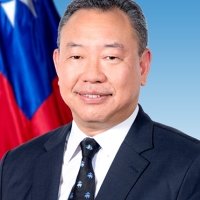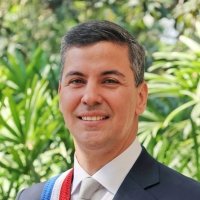Force Multipliers? U.S. and Taiwanese Interests in Latin America
Of Taiwan’s 15 official diplomatic partners, nine are in Latin America and the Caribbean. Yet as China continues to expand its influence in the region, Latin America has become a battleground for the power struggle between Taipei and Beijing. As the United States and China clash bitterly on a range of issues, Washington increasingly regards Taiwan as a force multiplier in Latin America, including as an alternative to Chinese financing. To fortify Taiwan’s foothold in Latin America, the White House has threatened to punish governments that establish relations with Beijing; in 2018, it pulled its senior diplomats from the Dominican Republic, El Salvador, and Panama in response to their decision to no longer recognize Taiwan.
Please join us for an online discussion on Taiwanese and U.S. cooperation in Latin America to push back against China, and how the increasingly tense cross-strait rivalry complicates relations between Latin America and China and Taiwan.
This event will be a live webcast on this webpage. You may submit questions for the speakers by emailing asia@wilsoncenter.org or tweeting us @AsiaProgram.
Speaker Quotes
Santiago Peña
“Market access is very important. Production is very important. But we know that Paraguay’s future relies on the human capital and the support, the example, and the knowledge that Taiwan is sharing with Paraguay. [As Minister of Finance], I didn’t receive any type of pressure from mainland China and again this is very clear. It’s not that they were not willing but they knew that the position from the Paraguay government is very strong. But of course, [China is] always trying to come from the side of the private sector, offering an infrastructure project, and financing at a very accessible rate.”
“Paraguay has built this strong relation with Taiwan; the relation with Japan has been a very strong relation, and with South Korea. These are the values that we share. Of course, China is still a big unknown for most of the Paraguayan. That’s why we need to defend, we need to educate, we need to inform the population that at some point it might feel attractive for a huge market [like China’s] to have access to Paraguay and export at higher prices but this is not the reality. This is only a phase that they try to portray and again, we need to also show what has happened with other countries in Latin America that have decided to switch relations and economic relations have not changed [...]. This is a constant process of educating, transmitting to the larger population and particularly to a private sector who might feel attracted to switch. They don’t understand this long-term relation when you’re talking about human capital, particularly education and health.”
“We need to continue to educate the population about not only the importance of trade relations but the importance of shared values and importance of democracy as the foundation to our societies.”
“It’s just a matter of the economic indicators and social indicators. You can see the huge failure of this relation because Argentina [as] the economic results and the social result were a complete failure. We suffered the economic collapse of Argentina, the election rate has been depreciated massively, and they have exhausted all international reserves. Again after again, we have seen promises that China will send international reserves or will do a swap agreement with the Central Bank but at the end, the economic foundations are very, very weak. So, we haven’t seen any economic impact and the same happened with Venezuela and the same happened with the case of Bolivia. I think it’s very clear that all the promises, all the announcements, all the big promises of investment or resources that are going to come to these countries have not materialized and the economic situation has not improved because of that.”
Alexander Tah-Ray Yui
“The thing is, PRC makes empty promises when they try to conquer or take our allies away. With Dominican Republic they promised hundreds of million of investments and billions worth of infrastructure projects. With El Salvador they promised a huge project conversion, they wanted to reconvert the whole eastern part of El Salvador, this massive project. We all know about the non-existent canal that they wanted to build in Nicaragua and so on and so forth. In Costa Rica, 2007, before they switched sides, they also promised lots of things.”
“With the US/PRC trade tensions ongoing, and also because production costs are rising in mainland China, many of our manufacturers are leaving mainland china. They’re trying to find other alternatives, and we think Latin America is a natural choice, besides the United States. Latin America is a natural choice for our production lines to resettle. Paraguay, case in point, we set up a Taiwan-Paraguay technical college to specifically train engineers so they are prepared, in terms of human resources, so when our factories are ready to go to Paraguay they already have the necessary skills to work with our business people.”
“There is no question of overreliance on the United States in terms of our work in Latin America. We found a reliable partner to work together with in Latin America and the Caribbean. We’ve been in Latin America for a long time: 80 years in some cases... again, United States, Japan, and other countries, we’ll call like-minded countries, we share the same values. So we think we can do positive and good things together. You mentioned over reliance—many people here in Taiwan and some western friends have asked if we over rely ourselves in terms of defense against possible privacy invasion. At the same time, we obviously will defend our own country, we will defend our own frontlines, but we appreciate the United States making available our purchase of defensive weapons to fend off any possible Chinese privacy invasion.”
Alex L.J. Shyy
“We aim to boost social and economic development, strengthen human resources and enhance economic relations in diplomatic allies and friendly countries to harmonize the different interests of beneficiaries. We require our project to include the voice of all stakeholders, from central government agencies to local communities. Currently the Taiwan IGDF focuses on five priority areas of operation in Latin America: economic development in agriculture, and especially in the micro, small and medium enterprises sector; public health and medical care information; and communication technology for good governance, climate resilience and adaptation; and capacity in higher education and vocational training.”
“We encourage government transparency of partner countries to promote political freedom and deepen democracy. The Taiwan IGDF has implemented a government project to assist the Latin American countries in using IGT to streamline constructive procedures, improve bureaucratic structures, and provide faster and more efficient service to its people for better governance to achieve sustainable results.”
“Last night…Taiwan IGDF secretary general signed a small and medium loan agreement with Paraguay’s corporate and development foundation…to assist Paraguay’s small and medium enterprises at this period, and also after the pandemic, [to] continue their manufactur[ing] operations.”
Julie Chung
“Five or even ten years ago, everybody thought the concerns about China’s bad corrupt practices, poor transparency, poor human rights record... that was an Asia problem. That was relegated to just the Asia-Indo Pacific. I think we soon learned that China exports these bad practices throughout the world to Europe, to Africa, and certainly our hemisphere, the Western Hemisphere. I think it really comes down to values; looking for like-minded partners who share our values, who have the innovation and the will and the resources. Why wouldn’t we work together to promote good governance and democratic and transparent policies in this region. I think that’s something we hadn’t done very much of in the past, frankly. So I think Taiwan is a natural partner, a reliable partner, and as you noted, nine out of fifteen countries have recognized Taiwan diplomatically are in the Western Hemisphere. So that brings extra relevance as to why Taiwan and the U.S. are and should be working together more.”
“Part of the values issue is Venezuela—something that we and partners in the region, including Paraguay have very strongly coalesced together in promoting a democratic transition in Venezuela. That is one of our top priorities in the Western Hemisphere bureau. And then we look at what other influences outside the region are doing, like Russia and China. China is aiding and abetting, basically, the Maduro regime with not only economic benefits but cybersecurity aid and technical assistance. In contrast, last year we invited Taiwan to provide humanitarian assistance to the migrants who were exiting Venezuela and they provided over five hundred thousand dollars.”
“The United States has provided over $20 billion dollars globally to address the pandemic. And over $4.9 billion dollars of US private sector individuals and philanthropic groups have contributed. That’s larger than any country. So when you talk about immediate assistance, we have to pool together not just governmental assistance, and again immediate donations en masse and PPE, but pooling together all the foundations, NGO’s, private sector individuals who have also contributed. And we have seen that greatly from the Taiwan population as well.”
Scott W. Harold
“Taiwan has a very good story to tell about its aid and assistance programs to Latin America that differs dramatically from China’s. Taiwan’s approach is to develop human capital in the region and to build long-lasting relationships. China’s approach is to arrive with a bag of money and promise to build you infrastructure, that they will use Chinese labor to build, that they will often build shoddily, and that they will then extract resources out of the ground in exchange for which they will then ship back finished goods, furthering Latin America’s cycle of dependence and its role as purely a source of [primary resources] - which is not really a pathway to economic development.”
“I just think there’s a whole variety of plays that are at stake here. The good piece here is that Taiwan has a lot of tools in its toolkit. It has been expanding the global cooperation and training framework program [...]. There’s a variety of tools that Taiwan has at its disposal. But ultimately, you are correct to say that Taiwan cannot be certain, that it cannot make itself invulnerable to China’s overwhelming economic pull. For that reason, Taiwan has also been exploring and (with the U.S. assistance) trying to expand some of the less formal approaches to diplomacy—whether at the state-to-state, at the state-to-city, or city-to-city, or people-to-people levels—that will help grow this.”
“[Chinese diplomats] are operating in a political system right now that is incentivizing shows of extreme nationalism because the Chinese Community Party is warping towards fascism. It is an emphasis on nationalism, national socialism, and the glorification of the Chinese race under Xi Jinping. There’s a severe pressure being put on Chinese diplomats right now to show their bona fides. I think you’ve seen that there’s a major backlash in Latin America and in the Caribbean.”
About the Speakers
Julie Chung is Principal Deputy Assistant Secretary in the Bureau of Western Hemisphere Affairs. She was previously the Director for Japan in the Bureau of East Asian and Pacific Affairs and served as Acting Deputy Assistant Secretary from February-September 2018. A career member of the Senior Foreign Service, class of Minister-Counselor, she held positions as the Deputy Chief of Mission in Cambodia and Economic Counselor in Thailand. She has also served as the Deputy Political Counselor in Bogota. In Baghdad, she served as Chief of Staff coordinating civilian-military foreign assistance with thirteen agencies. She received a B.A. in Political Science from the University of California San Diego and an M.A. in International Affairs from Columbia University.
Scott W. Harold is a senior political scientist at the RAND Corporation, and an affiliate faculty member at the Pardee RAND Graduate School. He specializes in the foreign and defense policies of China, Japan, North and South Korea, and Taiwan. Prior to joining RAND in August 2008, Harold worked at the Brookings Institution's John L. Thornton China Center from 2006 to 2008. In addition to his work at RAND, since 2006 he has been an adjunct professor of security studies in the Security Studies Program at the Edmund A. Walsh School of Foreign Service at Georgetown University. He is also an adjunct professor of international affairs in the School of International and Public Affairs at Columbia University, and an adjunct professor of International Affairs in the Elliott School of International Affairs at The George Washington University. He received his PhD in political science from Columbia University.
Benjamin N. Gedan is deputy director of the Wilson Center’s Latin American Program and the director of its Argentina Project. He also serves as an adjunct professor at Johns Hopkins University. He is a former South America director on the National Security Council at the White House. Previously, Benjamin was responsible for Honduras and Argentina at the U.S. Department of State, and covered Central America and the Caribbean as an international economist at the U.S. Department of the Treasury. As a journalist, Benjamin reported for The Boston Globe, The Miami Herald and other publications. He is a former Fulbright scholar in Uruguay, and earned a Ph.D. in foreign affairs from the Johns Hopkins School of Advanced International Studies (SAIS). He graduated from Tufts University with a Bachelor’s in international relations, and received a Master’s in international economics and Latin American studies from SAIS.
Alexander Tah-Ray Yui is Director-General of the Department of Latin American and Caribbean Affairs at Taiwan’s Ministry of Foreign Affairs. Previously, he was Ambassador Extraordinary and Plenipotentiary to Paraguay; Director-General of the Bureau de Geneve, Delegation Culturelle et Economique de Taipei; Deputy Director-General of the Department of Central and South American Affairs at the Ministry of Foreign Affairs of Taiwan, and a Diplomacy Fellow at the Brookings Institution, among other posts. He received a BA in political science and modern languages, and an MA in Spanish literature, both from Texas A&M University.
Alex L.J Shyy is Deputy Secretary-General of Taiwan’s International Cooperation and Development Fund. Previously, he was an adviser to the European Bank for Reconstruction and Development, Mission leader of the Taiwan Investment and Trade Mission in Central America as well as Mission Leader for the Taiwan Technical Mission in Macedonia, among other postings. He has also been a board director of the Skopje Export Processing Zone and Bonum Company of Macedonia, and posted to the Minister’s Office with the Taiwan Ministry of Economic Affairs. He received a BA in international trade from Soochow University, and an MBA from Long Island University.
Speakers


Moderator

Hosted By

Indo-Pacific Program
The Indo-Pacific Program promotes policy debate and intellectual discussions on US interests in the Asia-Pacific as well as political, economic, security, and social issues relating to the world’s most populous and economically dynamic region. Read more


Latin America Program
The Wilson Center’s prestigious Latin America Program provides non-partisan expertise to a broad community of decision makers in the United States and Latin America on critical policy issues facing the Hemisphere. The Program provides insightful and actionable research for policymakers, private sector leaders, journalists, and public intellectuals in the United States and Latin America. To bridge the gap between scholarship and policy action, it fosters new inquiry, sponsors high-level public and private meetings among multiple stakeholders, and explores policy options to improve outcomes for citizens throughout the Americas. Drawing on the Wilson Center’s strength as the nation’s key non-partisan policy forum, the Program serves as a trusted source of analysis and a vital point of contact between the worlds of scholarship and action. Read more
